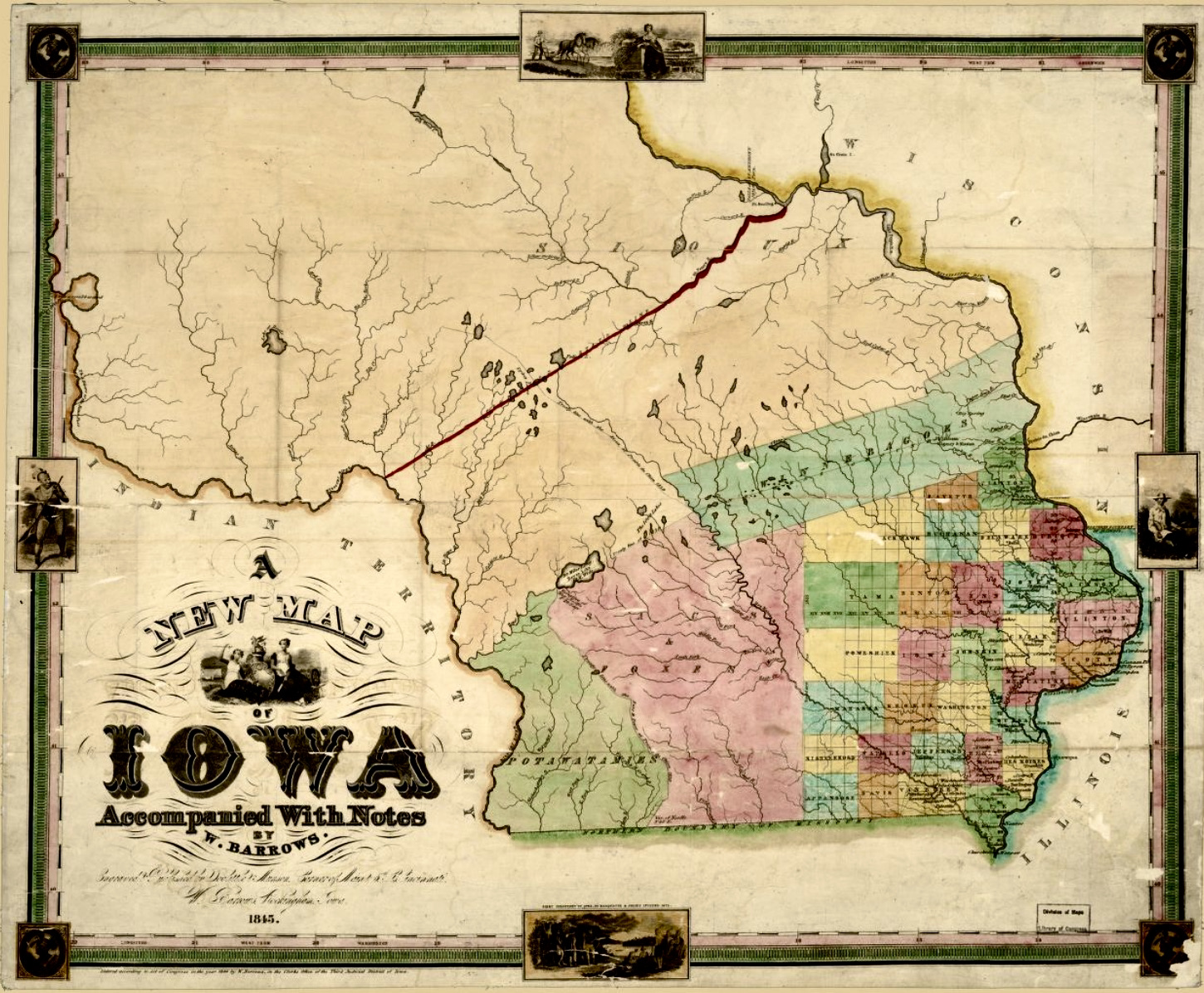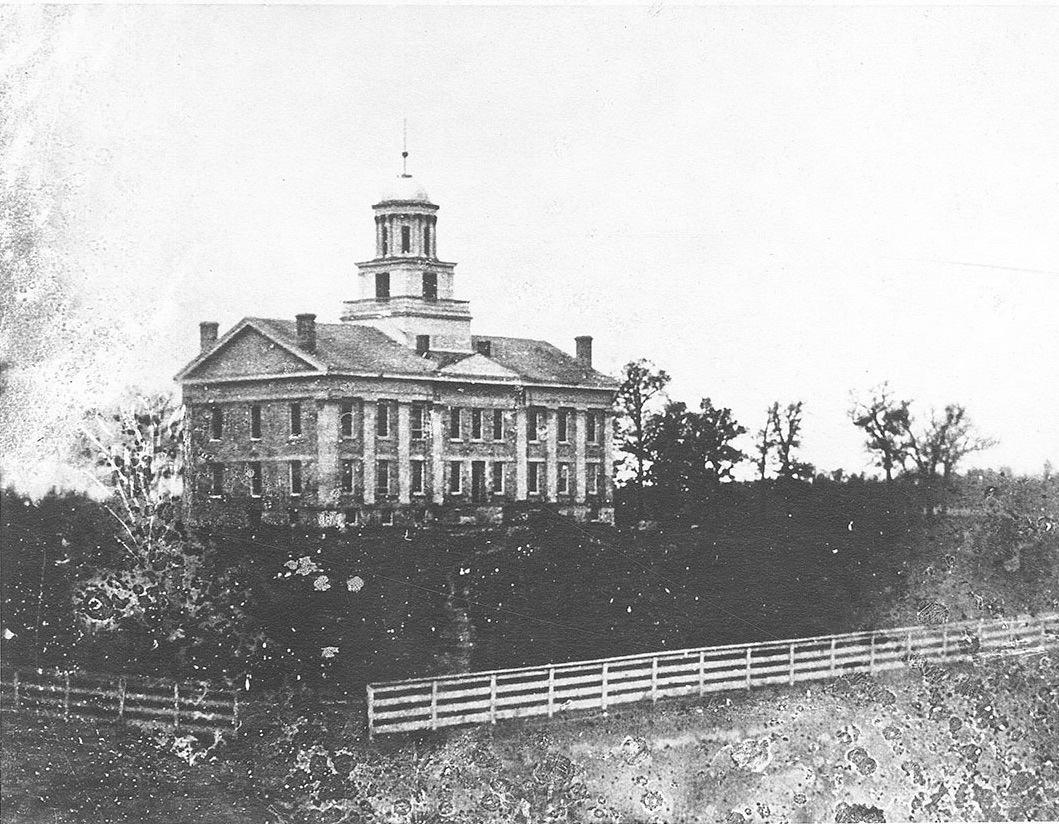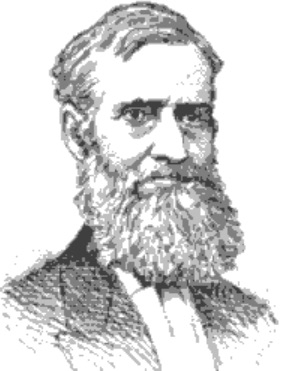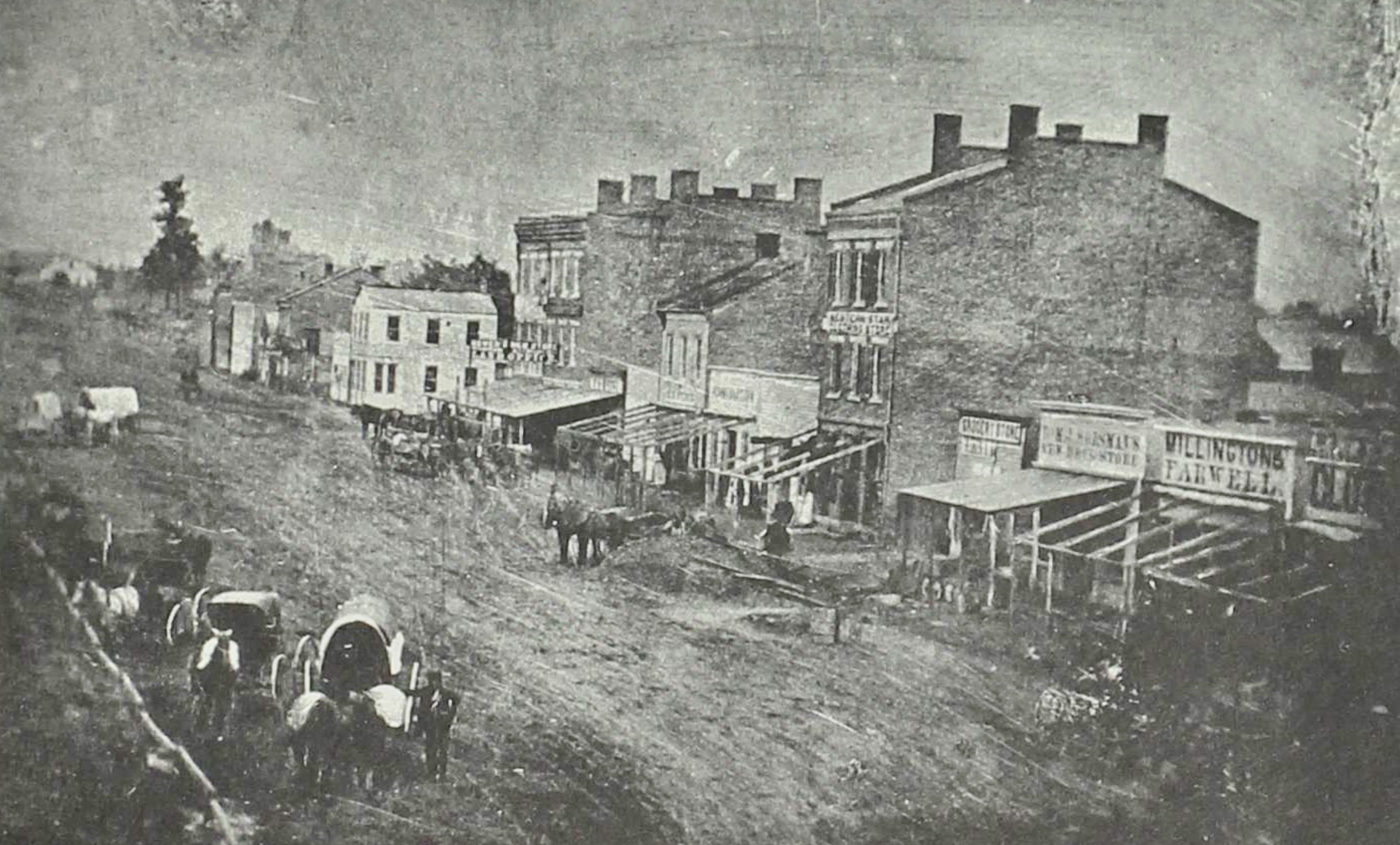

In the Hawkeye State, during the 1850’s, there might not be two better-known faces than Governor James W. Grimes and the Honorable Judge Charles T. Mason. Both men called Burlington in Des Moines County their home, with Grimes first arriving from New Hampshire in 1836 to practice law, and Mason, a lawyer from New York, arriving in 1837.


Burlington, at that time, had just become the capital city of Wisconsin Territory, and this little pioneer village that was only four years old was blossoming quickly. Between 1833, when it was first settled, and 1843, Burlington had literally become the center of the universe for those who were determined to go westward into this new land called Iowa.



In some ways, these two men from Des Moines County (see map above) were polar opposites. Politically, for example, Grimes was a simple man – a Whig – who in the 1850’s transitioned to become, what some call, ‘The Father of Republicanism.’ You can read more here. Mason, on the other hand, was a life-long Democrat who was a military student at West Point – graduating (1829) first in his class, which included Jefferson Davis and Robert E. Lee. Before coming to Iowa, Mason wrote for the New York Evening Post, a radical Democrat newspaper.
Yet, despite their differences, these two men from Burlington, who ended up becoming great friends over the years, were both Iowa farmers, living in Des Moines County. Two farmers, who both just happened to practice law on the side. And just as the great American story suggests, both lawyers, over time, became very successful – and prosperous – as they won friends across Iowa while influencing others.
But, just to be clear, when entering the realm of business and politics, one will, over time, tend to attract a den of nay-sayers as well. And, as we see in both of their stories, Grimes and Mason both had their flock of political enemies who would stoop to pretty much anything to discredit them in the sight of others. Which brings us, now to…





James W. Grimes – in the summer of 1853 – was in the midst of serving as an elected member to the Fourth General Assembly of Iowa – meeting in Iowa City – and was the recognized leader of the Whig minority. Grimes was known for his active interest in the improvement of Iowa’s school system, the encouragement of railroad building, the promotion of temperance, and opposition to the extension of slavery. Read more here. In 1853, James had helped establish the first agricultural journal in the state and was one of its editors. It was named The Iowa Farmer and Horticulturist and was published monthly at Burlington by Morgan McKenny. This piece of information will be important for us to know as we get into our letter.


Charles T. Mason – in the summer of 1853 – was just settling in to his newly-appointed position as Commissioner of U.S. Patents. Back in 1838, when Iowa became a Territory, President Martin Van Buren appointed Mason as Chief Justice of the three-man Territorial Supreme Court. One of Mason’s most prominent decisions was actually the very first case tried before the newly-formed Supreme Court. The case was entitled: In the matter of Ralph (a colored man), on Habeas Corpus, and focused on a Missouri farmer named Jordan J. Montgomery and his slave, Ralph, who was living and working in Dubuque. Despite Mason being a staunch Democrat – which at the time, in Iowa, tended to lean toward pro-slavery, he refused to allow politics to get in the way of standing for what was right. The Court decided in Ralph’s favor, setting a huge precedent for Iowa as a “free state.” Read more here.


After fifteen years, serving as a judge across Iowa, President Franklin Pierce appointed Mason – in March 1853 – to head up the U.S. Commission of Patents in Washington, D.C. His responsibilities included agriculture and weather information. A farmer himself, Mason promoted agricultural research, collected world statistics on tobacco and cotton, and authorized a system of obtaining national weather information by telegraph. An energetic reformer, Charles reorganized the system of applying for patents and hired the first women in regular employment in a federal office. Read more here.




As you will see, this 3-page handwritten letter from Representative James W. Grimes in Burlington to Judge Charles T. Mason in Washington D.C. covers a lot of different subjects. We will offer it to you – one section at a time (in bold italics), offering our commentary along the way. Note that I’ve edited a bit and added some punctuation to make the reading a bit easier. Enjoy!
Burlington – 15 July 1853
Dr Sir. Your favor of the 4th inst (of this month) was received yesterday.

Everyone here who cares to know and to do you justice is informed of the position you occupied in relation to the P&O RR Co. at the time the letters were written, but you must be aware that there are some men who are not only willing, but anxious, to make you a scapegoat to heave away their own sins. They have another story afloat now in relation to an effort of yours to prevent the rapids (from) being improved. The author of it has not been found. It is said to have started from (U.S. House Representative Bernhart) Henn, though I do not believe it.



Bernhart Henn, interestingly enough, was from Burlington, and was a fellow Democrat with Mason. But at the time, the Democratic Party in Iowa was deeply divided over the issues of slavery, as was most of the political world across the Hawkeye State. James G. Edwards – editor of The Burlington Hawk-Eye labelled Henn a “locofoco,” a slang term for a radical faction of the Democratic Party. More on all the politics a bit later.

You will sometimes know who are busy (creating accusations) at you, and you will find that they are men who you little suspect, and that they are certainly not your political opponent. The best way for you to do, is to take no notice of them. They will come to their senses after looking at a file awhile. Excuse my advice and I will give some more of it. Commit yourself to no man in this town. I know no one of them that I would trust, were I you, and least of all, those to whom you would be likely to confide.

As we said earlier, Burlington, over its first ten years of existence (1833-1843) was a hotbed for Iowa politics. And while, by 1853, it was no longer the capital of Iowa, it still was a very important center for business and politics. Certainly, Grimes, who, at the time, was the minority leader across the state for the Whig Party, knew full well how to, as the old saying goes – hold your political friends close, and your political enemies, even closer!

Everything is in a sort of transition state here, a kind of (hodge-podge). The wheel is turning round & something & somebody will be uppermost after a while, but who & what no one can tell. There are diverse things I would like to write you, but I do not wish to be the channel of communication.


Wow – what a mouthful we have here from Grimes. You can read more here, but suffice to say that the political climate across Iowa and the entire North, is in a huge transition. His Whig Party is as nearly divided as Mason’s Democratic Party. The issue of slavery has risen to the surface, and “old school” dinosaurs like Iowa’s U.S. Senators Dodge and Jones – with their pro-South view on slavery – are on their way out – soon to be replaced by anti-slavery leaders like James Harlan of Mt. Pleasant (1854), and Grimes himself in 1858. Here in July 1853, Representative Grimes, is seeing a big change coming, but we wonder if he fully realizes that within six months of this letter, he will be nominated for the governorship of Iowa, and soon become Iowa’s third governor?

I want to get a corn & cob crusher (below left) to go by horse power – one that will ground well, fine & speedily. Can you tell me which is the best & the price? What do you know of Pennock’s corn drill (below right)? I see some writer in the Pennsylvania Farm Journal speaks highly of it. Both these implements are needed here and I will introduce them if I can obtain the right ones. I have seen Leavitt’s crusher. Is there no better?




As the head of the U.S. Patent Department, Judge Mason – who is also a top-of-the-tray Iowa farmer – is certainly a great friend to ask when Grimes is looking for suggestions on new farm implements that are coming onto the market. As we mentioned earlier, Grimes is not only a fellow Iowa farmer, but he is also writing articles for his new monthly publication, The Iowa Farmer and Horticulturist. His interest – in this letter – is to hear more about the Pennock’s Corn Drill and the Leavitt Corn & Cob Crusher – two new products that might truly be helpful to Iowa farmers!

I was invited upon yesterday to write you a letter upon the subject of Colt’s pistols. It seems that Colt’s pistol patents are about expiring, and he wants them renewed. He had an agent here to obtain the influence of your friends in this state to induce you to grant the extension. I refused to do anything of that sort. Mr. Colt has become immensely rich already – is the greatest libertine and debaucher in New England, and I, for one, was quite willing that his application should stand upon its own merits.


Obviously, Grimes has little respect for Samuel Colt, and if we look at Grimes history as a politician, he is not swayed by money or power, but seems to be the kind of leader who sticks to his principles, even when it’s not popular. Read more here.

When a man gets rich on the patent papers out of the hands of the inventor – as in the case of the Parker Wheel and Woodworth Planing Machine, I do not believe it should be renewed. The industrial interests of the country over balance all claims the inventors & patentees and assignees may have set (for) them (to) have a reasonable time to make their fortunes & then let them stand on the same footing with others.

Zebulon Parker was a millwright, inventor, and amateur scientist who applied scientific methods to reaction water wheels. Working alongside his brother Austin, the Parker brothers received a patent (above left) for their reaction and percussion Water Wheel in 1829. William Woodworth designed, and then patented, the Woodworth Planing Machine (above right) in 1828. Hailed as one of the most important inventions of the century, it added speed and efficiency to the process of creating lumber for domestic usage.
From what Grimes is saying here, it appears that other investors took over the original patents on these two inventions, made a big fortune, and now, like Samuel Colt, wanted special favors from the U.S. Patent Office so they can continue to rake in the $$$ on an invention that should, all these years later, be released for the good of the general public. Sounds like the same reasoning that common sense people make today when insisting that Big Pharma release some of their big money-makers, so the general public can buy the drugs at reasonable prices!

The “Farmer drags its slow length along”, but it accomplishes him but little. I am almost discouraged but I am resolved that it shall be kept up again. One circulation in Des Moines (outside of town) is very small. I believe that there is less spent of improvement among the farmers of Des Moines County than among those of any other county of the state.


The rich get rich and the poor get poorer. While Grimes is a very successful businessman, ending up at the end of his life as one of the wealthiest men in Iowa, he shows through both his words and actions that he never forgets the poor and middle-class – standing up for the average Joe and Jill who work hard for every penny they earn. There’s a popular story about Grimes, and his care for the “average working-man” that would be good to share here…


Let me know about the cob & corn crusher & planter.
Yours truly &tc – James W. Grimes.
In closing, Grimes reminds his friend to get back to him ASAP about the farm implements, and according to the back side of the letter (see below), Mason jotted down the date Grimes wrote his letter – July 15, 1853, and the day he answered – July 29, 1853. Thanks, James & Charles, for this wonderful letter that gives us a fascinating look into life in Iowa in 1853 – the year my Boller family – farmers as well – settled in Johnson County!



For more about where the lives of these two amazing Iowans went on from here, follow there links below…
– Gov. James W. Grimes – The ‘Wide Awake’ Father Of Republicanism.
– The Letters Of Governor James W. Grimes.
– Charles T. Mason – Here Comes The Judge.
– Fales To Mason – Iowa City To Burlington – 1850.
Kudos to the amazing resources below for the many quotes, photographs, etc. used on this page.
Representative James Wilson Grimes, Iowa Legislature
Charles Mason, University of Iowa – The Biographical Dictionary of Iowa
An Overlooked 1853 List of Iowa Plants by a Pseudonymous Botanist: Who Was “Flores”?, bioone,org
19th Century Farm Implements, AmericanArtifacts.com
Portable grain-mill, C. Leavitt Grinding Mill patent, 1852, Google patents
1836 Inventor Colt Patents Revolver Becomes Famous, MFEditor, March 15, 2019
Zebulon Parker & The Parker Wheel, Papers of Abraham Lincoln Digital Library
Parker’s Water Wheel, Scientific American, May 4, 1850
Woodworth Planing Machine, Scientic American, July 27, 1850
Anecdote of Gov. Grimes of Iowa, Annals of Iowa, Volume 1, Issue 13, 1866, p 607-608
Charles Thomas Mason, Find-A-Grave
Click here to go on to the next section…
Click here for a complete INDEX of Our Iowa Heritage stories…
